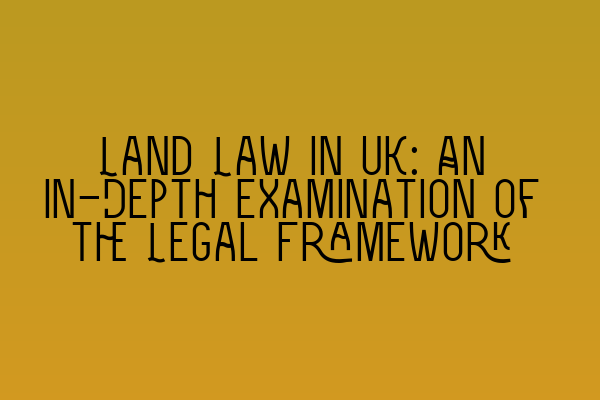Land Law in the UK: An In-Depth Examination of the Legal Framework
Welcome to SQE Property Law & Land Law! As a leading solicitor firm specializing in property law and land law in the UK, we understand the importance of providing comprehensive and up-to-date information on the legal framework governing land ownership and transactions. In this blog post, we will take you on a journey through the intricacies of land law and equip you with the knowledge you need to navigate this complex field.
Land law in the UK is governed by a variety of statutes, common law principles, and case law. The legal framework surrounding land ownership and transactions is not only extensive but also constantly evolving. This makes it essential for individuals and businesses involved in property matters to stay informed about the relevant laws and regulations.
One of the key concepts in land law is the distinction between real property and personal property. Real property refers to land and any structures built on it, while personal property encompasses movable objects such as furniture, equipment, and vehicles. The laws governing these two types of property differ significantly, and it is crucial to understand the distinctions when dealing with land-related matters.
Ownership of land in the UK is primarily based on the principle of freehold and leasehold. Freehold ownership grants individuals the absolute right to own land outright, whereas leasehold ownership involves a lease agreement between the landowner (the freeholder) and the occupier (the leaseholder). Understanding the rights and responsibilities associated with each type of ownership is vital for both landlords and tenants.
Acquiring and transferring ownership of land in the UK involves a series of legal processes and procedures. One of the most fundamental aspects of land law is the conveyancing process, which involves the transfer of legal title from one party to another. This complex process requires a meticulous examination of legal documents, property searches, and negotiations between the parties involved.
Furthermore, land law in the UK provides certain legal protections for third parties, such as easements and restrictive covenants. Easements are rights that individuals or entities have over another person’s land, such as the right of way or the right to access utilities. Restrictive covenants, on the other hand, impose certain limitations or obligations on the landowner, such as restrictions on building or using the land in specific ways. These legal mechanisms ensure the orderly use and enjoyment of land by all parties involved.
Another crucial aspect of land law is the regulation and management of land use planning. The planning system in the UK controls the development and use of land to ensure that it is in the best interest of the public and the environment. Local authorities play a significant role in granting planning permissions, enforcing planning regulations, and resolving disputes related to land use. Compliance with planning regulations is essential to avoid legal issues and potential penalties.
To gain a deeper understanding of land law and its practical applications, it is beneficial to familiarize oneself with key cases and legal precedents. Land law is heavily influenced by judicial decisions, and landmark cases often establish principles that guide subsequent legal interpretations. Studying notable cases can help individuals and businesses anticipate potential outcomes and make informed decisions regarding land-related matters.
In conclusion, land law in the UK is a complex and multifaceted legal field that governs the ownership, transfer, and use of land. Understanding the legal framework surrounding land ownership, conveyancing, easements, restrictive covenants, and land use planning is vital for individuals and businesses involved in property matters. Being equipped with the necessary knowledge and working with experienced solicitors can help navigate the intricacies of land law and ensure compliance with legal obligations.
To further enhance your understanding of related legal subjects, we invite you to explore the following articles on our website:
– Understanding Contractual Capacity: Rights and Limitations
– Interactive SQE Mock Tests for Contract Law: Test Your Knowledge
– Join Our SQE Contract Law Webinars: Expert Insights and Guidance
– Contract Law Reforms: An Analysis of Recent Changes
– Parties in a Contract: Rights and Responsibilities
At SQE Property Law & Land Law, we offer expert legal advice and representation in all aspects of property law and land law. Our team of experienced solicitors is committed to providing exceptional service and ensuring that our clients’ interests are protected. Contact us today for reliable and professional assistance with your property law needs.
Disclaimer: The information provided in this blog post is for general informational purposes only and should not be considered legal advice. For specific legal advice regarding your land-related matters, please consult with a qualified solicitor.
